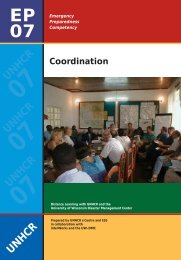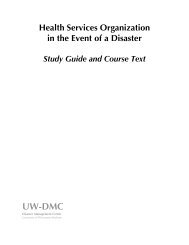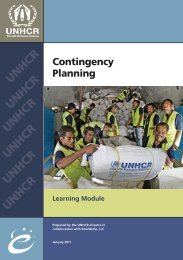Managing External Relations - Disaster Management Center ...
Managing External Relations - Disaster Management Center ...
Managing External Relations - Disaster Management Center ...
You also want an ePaper? Increase the reach of your titles
YUMPU automatically turns print PDFs into web optimized ePapers that Google loves.
EP<br />
04<br />
80<br />
<strong>Managing</strong> <strong>External</strong> <strong>Relations</strong><br />
In addition to the tools described above, important reference materials related to developing<br />
external relations strategies are included at the end of each of the following sections . These<br />
materials should be accessible to all staff for use in building group and personal strategies and should<br />
be ‘on hand’ in all offices. Copies should be provided or staff should be informed of the location of<br />
the materials, for example, in a library or on the Internet.<br />
Strengthening <strong>Relations</strong>hips with Partners<br />
In an emergency, the typical scenario might involve stress and chaos in the face of overwhelming<br />
needs, exacerbated by difficulties in communication and inadequate response capacities. In complex<br />
emergencies, the response may involve a wide range of actors, including military forces, and<br />
extensive resources, all requiring co-ordination to meet the needs of the affected population.<br />
To speed the process at the onset of an emergency, the mechanisms and relationships needed for<br />
co-ordination should be visualised and cultivated if possible prior to the emergency. The process can<br />
be enhanced through development of a strategy for external relations, as suggested below.<br />
(1) Establish goals and objectives for external relations — Specific goals should be developed<br />
relevant to your situation based on or incorporating the following general goals:<br />
♦ Promote constructive relations with institutions with related concerns.<br />
♦ Resolve problems and keep in mind long-term objectives when achieving short-term goals.<br />
♦ Provide sufficient advice and information to all government authorities, implementing<br />
partners and other UN agencies.<br />
♦ Understand concerns and information needs of other groups and institutions.<br />
♦ Encourage government responsibility for refugee issues.<br />
Goals and objectives should also be based on removing or addressing barriers to co-operation,<br />
co-ordination and collaboration. Objectives and activities should be changed as barriers or obstacles<br />
are identified throughout the emergency operation. Cultivate and improve inter-agency relationships<br />
through the use of networking, facilitation, negotiation, presentation skills and observation of agreed<br />
codes of conduct, standards, and principles such as the PARinAC principles (with NGOs). Other<br />
guidelines of this type are the Code of Conduct, and the current work of the Sphere standards<br />
sponsored by the IFRC and others. Some barriers to inter-agency relationships, such as inefficient<br />
bureaucracies or frequent staff turnover, may also require capacity building efforts.<br />
During an emergency, how can you establish practical goals to address<br />
capacity building needs?<br />
Capacity building needs can be identified prior to and during the emergency and discussed with all<br />
relevant partners, including government, other UN agencies and NGOs. If such needs cannot be<br />
addressed quickly during the emergency, they should become part of a longer-term strategy for<br />
rehabilitation and recovery.








